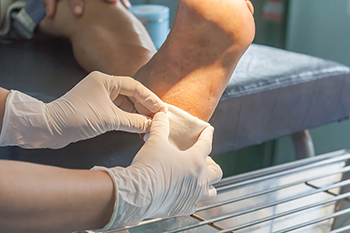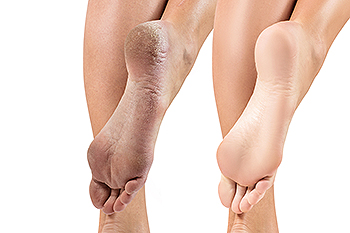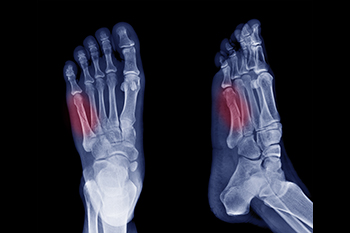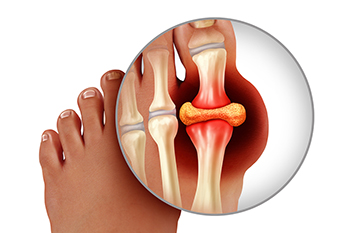Items filtered by date: August 2023
Effective Foot Wound Care

Proper wound care for the feet is a crucial aspect of maintaining overall health and mobility. Whether managing minor cuts, blisters, or more substantial injuries, tending to foot wounds can help to prevent complications and expedite healing. Wound care can begin by cleaning the affected area gently with mild soap and lukewarm water, and patting it dry without rubbing. This can be followed by applying an appropriate antiseptic, which can help to prevent infections. Covering the wound with a sterile bandage or dressing can safeguard it from dirt and friction. It is beneficial to regularly change the dressing and monitor the wound's progress, keeping an eye out for signs of infection, such as increased redness, swelling, or pus. If the wound does not show signs of improvement or healing, seeking medical attention is essential to ensure a seamless recovery process for your feet. If you have a foot wound, it is strongly suggested that you confer with a podiatrist who can effectively treat wounds on the feet.
Wound care is an important part in dealing with diabetes. If you have diabetes and a foot wound or would like more information about wound care for diabetics, consult with Jordan S. Steinberg, DPM from Florham Park Podiatry . Our doctor will assess your condition and provide you with quality foot and ankle treatment.
What Is Wound Care?
Wound care is the practice of taking proper care of a wound. This can range from the smallest to the largest of wounds. While everyone can benefit from proper wound care, it is much more important for diabetics. Diabetics often suffer from poor blood circulation which causes wounds to heal much slower than they would in a non-diabetic.
What Is the Importance of Wound Care?
While it may not seem apparent with small ulcers on the foot, for diabetics, any size ulcer can become infected. Diabetics often also suffer from neuropathy, or nerve loss. This means they might not even feel when they have an ulcer on their foot. If the wound becomes severely infected, amputation may be necessary. Therefore, it is of the upmost importance to properly care for any and all foot wounds.
How to Care for Wounds
The best way to care for foot wounds is to prevent them. For diabetics, this means daily inspections of the feet for any signs of abnormalities or ulcers. It is also recommended to see a podiatrist several times a year for a foot inspection. If you do have an ulcer, run the wound under water to clear dirt from the wound; then apply antibiotic ointment to the wound and cover with a bandage. Bandages should be changed daily and keeping pressure off the wound is smart. It is advised to see a podiatrist, who can keep an eye on it.
If you have any questions, please feel free to contact our office located in Florham Park, NJ . We offer the newest diagnostic and treatment technologies for all your foot care needs.
Plantar Warts Can Be Treated!
Remedies for Cracked Heels

Cracked heels, those uncomfortable and unsightly fissures in the skin, often catch us off guard. Cracked heels can occur for a variety of factors, with dry skin being a prominent contributor. Excessive exposure to harsh weather, improper footwear, and prolonged standing can exacerbate the issue. Prevention starts with consistent moisturization that consists of regular application of a thick, emollient foot cream that can help to keep the skin supple. Exfoliating gently removes dead skin cells, allowing better absorption of moisturizers. Additionally, wearing well-fitting shoes with proper cushioning minimizes pressure on the heels. In cases of severe cracking, medical attention from a podiatrist may be necessary. Prescription creams and ointments, along with professional treatment, can help to provide relief. Embracing a routine of foot care and protective measures is key to healing those cracks and restoring smooth, comfortable feet. If you are afflicted with cracked heels, it is suggested that you contact a podiatrist.
Cracked heels are unsightly and can cause further damage to your shoes and feet. If you have any concerns, contact Jordan S. Steinberg, DPM from Florham Park Podiatry . Our doctor can provide the care you need to keep you pain-free and on your feet.
Cracked Heels
Cracked heels appear unappealing and can make it harder for you walk around in sandals. Aside from looking unpleasant, cracked heels can also tear stockings, socks, and wear out your shoes. There are several methods to help restore a cracked heel and prevent further damage.
How Do You Get Them?
Dry skin is the number one culprit in creating cracked heels. Many athletes, walkers, joggers, and even swimmers suffer from cracked heels. Age and skin oil production play a role to getting cracked heels as well.
Promote Healing
Over the counter medicines can help, especially for those that need instant relief or who suffer from chronic dry feet.
Wear Socks – Wearing socks with medicated creams helps lock in moisture.
Moisturizers – Applying both day and night will help alleviate dryness which causes cracking.
Pumice Stones – These exfoliate and remove dead skin, which allows for smoother moisturizer application and better absorption into the skin.
Change in Diet
Eating healthy with a well-balanced diet will give the skin a fresh and radiant look. Your body responds to the kinds of food you ingest. Omega-3 fatty acids and zinc supplements can also revitalize skin tissue.
Most importantly, seek professional help if unsure how to proceed in treating cracked heels. A podiatrist will help you with any questions or information needed.
If you have any questions, please feel free to contact our office located in Florham Park, NJ . We offer the newest diagnostic and treatment technologies for all your foot care needs.
Facts About a Jones Fracture in the Foot

A Jones fracture occurs in the fifth metatarsal, which is the long bone located on the outside of the foot. The name derives from Sir Robert Jones, who first reported the injury in 1902. A Jones fracture occurs at the base of the part of the metatarsal nearest the ankle. It can be the result of stress on the bone from repeated movement, as well as from overuse or a traumatic injury. The fifth metatarsal differs from the other four metatarsals, in that the base juts out slightly. The metatarsals are used mainly for balance while standing and walking, and as a result, they get more use than other bones in the foot. A Jones fracture may be slow to heal and sometimes may not heal at all. Chances of a recurrence are high with this type of injury. The healing period may take up to two months, but pain may be experienced for three to six months. A brace or cast may be prescribed, and in a limited number of cases, surgery may be needed to repair the bone. For more information about a Jones fracture, it is suggested that you make an appointment with a podiatrist.
A broken foot requires immediate medical attention and treatment. If you need your feet checked, contact Jordan S. Steinberg, DPM from Florham Park Podiatry . Our doctor can provide the care you need to keep you pain-free and on your feet.
Broken Foot Causes, Symptoms, and Treatment
A broken foot is caused by one of the bones in the foot typically breaking when bended, crushed, or stretched beyond its natural capabilities. Usually the location of the fracture indicates how the break occurred, whether it was through an object, fall, or any other type of injury.
Common Symptoms of Broken Feet:
- Bruising
- Pain
- Redness
- Swelling
- Blue in color
- Numbness
- Cold
- Misshapen
- Cuts
- Deformities
Those that suspect they have a broken foot shoot seek urgent medical attention where a medical professional could diagnose the severity.
Treatment for broken bones varies depending on the cause, severity and location. Some will require the use of splints, casts or crutches while others could even involve surgery to repair the broken bones. Personal care includes the use of ice and keeping the foot stabilized and elevated.
If you have any questions please feel free to contact our office located in Florham Park, NJ . We offer the newest diagnostic and treatment technologies for all your foot and ankle needs.
Elderly Foot Care

Maintaining proper foot health is crucial for elderly individuals as it ensures comfort, mobility, and independence. If a senior has a caregiver, they can play a vital role in assisting them with their foot care between podiatrist appointments and pedicures. Incorporating a regular foot care routine can significantly benefit their overall well-being. Foot soaks can be a soothing and effective way to soften toenails before trimming them straight across and filing the edges. This helps prevent ingrown toenails and ensures proper nail maintenance. Moisturizing the feet regularly is essential to prevent cracked heels, which can be uncomfortable and lead to complications. Foot massages are not only a luxurious treat but also aid in improving blood circulation, relieving tension, and providing comfort to aging feet. Gently massaging the feet can be a relaxing and enjoyable activity for both seniors and caregivers. Choosing supportive footwear that fits well is essential for seniors. Ill-fitting shoes can cause discomfort and increase the risk of foot problems and falling. In addition to regular at-home foot care, regular check-ups and preventative care advice from a podiatrist can help identify and address potential foot issues before they become more significant problems.
Proper foot care is something many older adults forget to consider. If you have any concerns about your feet and ankles, contact Jordan S. Steinberg, DPM from Florham Park Podiatry . Our doctor can provide the care you need to keep you pain-free and on your feet.
The Elderly and Their Feet
As we age we start to notice many changes in our body, but the elder population may not notice them right away. Medical conditions may prevent the elderly to take notice of their foot health right away. Poor vision is a lead contributor to not taking action for the elderly.
Common Conditions
- Neuropathy – can reduce feeling in the feet and can hide many life-threatening medical conditions.
- Reduced flexibility – prevents the ability of proper toenail trimming, and foot cleaning. If left untreated, it may lead to further medical issues.
- Foot sores – amongst the older population can be serious before they are discovered. Some of the problematic conditions they may face are:
- Gouging toenails affecting nearby toe
- Shoes that don’t fit properly
- Pressure sores
- Loss of circulation in legs & feet
- Edema & swelling of feet and ankles
Susceptible Infections
Diabetes and poor circulation can cause general loss of sensitivity over the years, turning a simple cut into a serious issue.
If you have any questions please feel free to contact our office located in Florham Park, NJ . We offer the newest diagnostic and treatment technologies for all your foot and ankle needs.
Symptoms That May Indicate Gout

Gout is an inflammatory condition that causes extreme pain in the joints and is particularly common in the big toe. Patients with gout suffer from hyperuricemia, an overabundance of uric acid in the bloodstream. Uric acid then crystallizes, forming sharp, short needles that settle in the joint and cause extreme pain. Anyone can suffer from gout, but it is more common among men over the age of 30. Risk factors for gout are genetics, alcohol use, and a diet rich in foods that contain a high level of purines. These include red meat, seafood, and beverages made with alcohol or large amounts of sugar. The top indicator of gout in the big toe is severe pain. This may come on suddenly and typically occurs at night. The intense pain can linger for days. Swelling, tenderness, and redness are also hallmarks of gout. The skin on the toe may begin to peel and then become itchy and flaky. It also may begin to feel hot to the touch. In some cases, a low-grade fever develops, along with flu-like symptoms. If you believe you may have gout in the big toe, it is suggested that you make an appointment with a podiatrist who can offer treatment options.
Gout is a painful condition that can be treated. If you are seeking treatment, contact Jordan S. Steinberg, DPM from Florham Park Podiatry . Our doctor will treat your foot and ankle needs.
What Is Gout?
Gout is a form of arthritis that is characterized by sudden, severe attacks of pain, redness, and tenderness in the joints. The condition usually affects the joint at the base of the big toe. A gout attack can occur at any random time, such as the middle of the night while you are asleep.
Symptoms
- Intense Joint Pain - Usually around the large joint of your big toe, and it most severe within the first four to twelve hours
- Lingering Discomfort - Joint discomfort may last from a few days to a few weeks
- Inflammation and Redness -Affected joints may become swollen, tender, warm and red
- Limited Range of Motion - May experience a decrease in joint mobility
Risk Factors
- Genetics - If family members have gout, you’re more likely to have it
- Medications - Diuretic medications can raise uric acid levels
- Gender/Age - Gout is more common in men until the age of 60. It is believed that estrogen protects women until that point
- Diet - Eating red meat and shellfish increases your risk
- Alcohol - Having more than two alcoholic drinks per day increases your risk
- Obesity - Obese people are at a higher risk for gout
Prior to visiting your podiatrist to receive treatment for gout, there are a few things you should do beforehand. If you have gout you should write down your symptoms--including when they started and how often you experience them, important medical information you may have, and any questions you may have. Writing down these three things will help your podiatrist in assessing your specific situation so that he or she may provide the best route of treatment for you.
If you have any questions, please feel free to contact our office located in Florham Park, NJ . We offer the newest diagnostic and treatment technologies for all your foot care needs.

